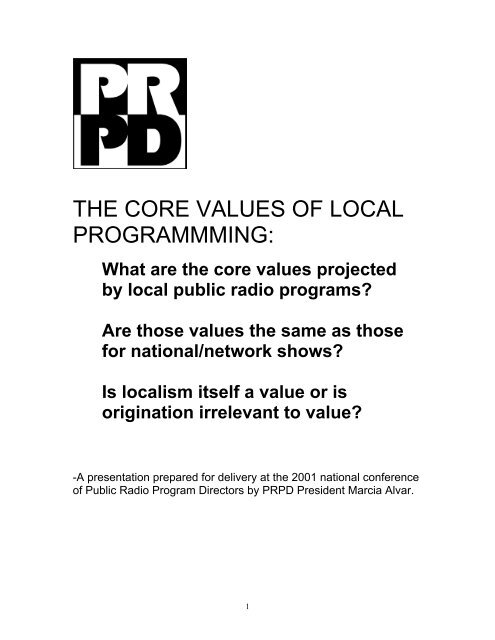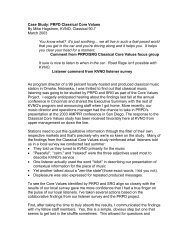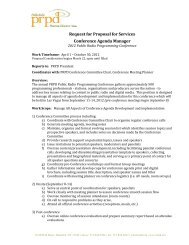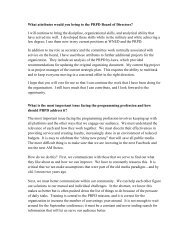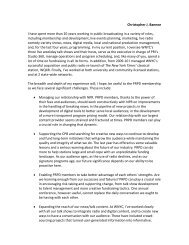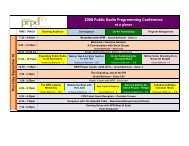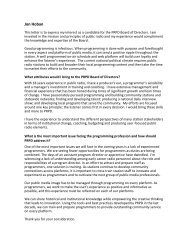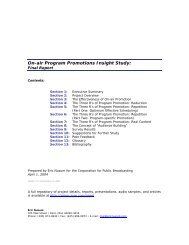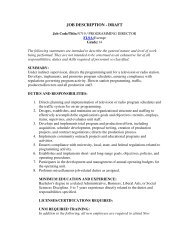The Core Values of Local Programming - PRPD
The Core Values of Local Programming - PRPD
The Core Values of Local Programming - PRPD
Create successful ePaper yourself
Turn your PDF publications into a flip-book with our unique Google optimized e-Paper software.
THE CORE VALUES OF LOCAL<br />
PROGRAMMMING:<br />
What are the core values projected<br />
by local public radio programs?<br />
Are those values the same as those<br />
for national/network shows?<br />
Is localism itself a value or is<br />
origination irrelevant to value?<br />
-A presentation prepared for delivery at the 2001 national conference<br />
<strong>of</strong> Public Radio Program Directors by <strong>PRPD</strong> President Marcia Alvar.<br />
1
<strong>The</strong> <strong>Core</strong> <strong>Values</strong> <strong>of</strong> <strong>Local</strong> <strong>Programming</strong>, is a project conducted in June, 2001 by<br />
<strong>PRPD</strong>, George Bailey <strong>of</strong> Walrus Research and four partner stations<br />
• WBEZ, Chicago<br />
• Connecticut Public Radio<br />
• KUOW, Seattle<br />
• KQED, San Francisco<br />
Thanks to Torey Malatia, Kim Grehn and John Berky, Jeff Hansen and Wayne<br />
Roth and Jo Anne Wallace for their support and their participation. I'd also like to<br />
express my appreciation for the thoughtfulness and the insights <strong>of</strong>fered by the<br />
listeners we met during the course <strong>of</strong> this project.<br />
At last year's <strong>PRPD</strong> Conference, we presented the results <strong>of</strong> <strong>PRPD</strong>'s <strong>Core</strong><br />
<strong>Values</strong> Summit, a meeting convened by <strong>PRPD</strong> to talk with the executive<br />
producers <strong>of</strong> the top seven programs in public radio:<br />
• Morning Edition<br />
• All Things Considered<br />
• Marketplace<br />
• Car Talk<br />
• Fresh Air<br />
• A Prairie Home Companion<br />
• Talk <strong>of</strong> the Nation<br />
<strong>The</strong> summit had two goals:<br />
• To create a vocabulary <strong>of</strong> the shared qualities and values embodied in and<br />
across that body <strong>of</strong> programs<br />
• To explore how public radio's highest standards are set and maintained -- by<br />
deconstructing the decision-making process used on a daily and weekly basis<br />
to draw the line between what goes into these programs and what doesn't .<br />
Over the past year, the results <strong>of</strong> the summit have been widely distributed in a<br />
<strong>PRPD</strong> report called Defining Public Radio's <strong>Core</strong> <strong>Values</strong>. Thanks to NPR for<br />
including a presentation <strong>of</strong> the report at this year's PRC, and to the CBC for<br />
extending an invitation to speak on core values at a national meeting <strong>of</strong> their<br />
reporters and producers next month in Toronto. But most gratifying is how <strong>PRPD</strong><br />
members are using the core values report to talk about public radio with their<br />
staffs, boards, licensees and listeners. As Bill Thomas <strong>of</strong> Prairie Public Radio<br />
wrote me recently:<br />
" It resonates much better than the mission statement and is shorter than<br />
the long-range plan. It sums up the essence <strong>of</strong> public radio so accurately<br />
2
and in such an instantly recognizable way that I always get "aahs" <strong>of</strong><br />
recognition – you can almost hear people thinking "yes—that's it—it does<br />
fit together—that's public radio."<br />
<strong>The</strong> focus <strong>of</strong> the first core values report was national programming<br />
Today our focus is public radio's local programming.<br />
<strong>The</strong> inspiration for all <strong>of</strong> this work was Audience 98. It told us that our national<br />
programming is more highly valued by our listeners than our local programming.<br />
But Audience 98 presented a puzzle for us to look at on the local level -- an<br />
exception in the way listeners responded to one particular type <strong>of</strong> local<br />
programming -- stand-alone local news and call-in programs which Audience 98<br />
said <strong>of</strong>fered a very high return from listeners. This is the puzzle we set out to<br />
explore in our look at the core values <strong>of</strong> our local programming.<br />
Before I talk about what we found I want to emphasize that in addition to our<br />
focus today, there are other important forms <strong>of</strong> local programming – different<br />
forms <strong>of</strong> news, and many approaches to culture and music. I think it's reasonable<br />
to assume that the core values we identified last year and that we'll talk more<br />
about today will also play out in some fashion in these other genres and formats.<br />
We just won't know for sure until we look. And the details <strong>of</strong> how we create and<br />
deliver value in these other genres and formats may require different kinds <strong>of</strong><br />
solutions than the ones we'll hear about in this session.<br />
A bit about the methodology we used in our look at local news and call-in<br />
programs:<br />
<strong>PRPD</strong> identified stations in four markets where there has been a long-time<br />
investment in stand alone local news and call-in programs. We wanted to focus<br />
on programs that air Monday-Friday, are at least one hour in length and<br />
scheduled adjacent to either Morning Edition or ATC.<br />
<strong>The</strong> stations and programs that participated are:<br />
• Eight Forty-Eight, a daily morning magazine produced by WBEZ<br />
• <strong>The</strong> Faith Middleton Show, an afternoon call-in on Connecticut Public Radio<br />
• Weekday, a morning call-in on KUOW<br />
• Forum a morning call-in on KQED<br />
In June, George Bailey <strong>of</strong> Walrus Research conducted eight focus groups; two in<br />
each partner city. Tape excerpts from all four programs were played for every<br />
listener group. As you'll see the men and women met separately – routinely done<br />
in focus groups to encourage more candid and relaxed group conversation. Most<br />
<strong>of</strong> the people we talked with were core listeners – our biggest fans—but not all <strong>of</strong><br />
them.<br />
3
"I don't listen to it all day - or I mean ever - because at work I can't listen to<br />
a radio so that eliminates a lot <strong>of</strong> time. I don't listen to it early in the<br />
morning because listen to WBBM cause when I get up, I want to know if<br />
the world is still intact and how I'm going to get to work.<br />
Tell me more about that. You said when you get up you need to know if<br />
the world is intact. Why do you need to go to WBBM for that?<br />
Doesn't...wouldn't WBEZ tell you if the world was intact?<br />
It might but I think it would take them a lot longer"<br />
Our goal was to explore three fundamental questions:<br />
• What are the core values projected by these local programs?<br />
• Are the core values the same as those for the national, network shows?<br />
• Is localism itself a value or is origination irrelevant to value?<br />
Last year's core values summit produced a vocabulary <strong>of</strong> qualities that define the<br />
fundamental appeal <strong>of</strong> public radio's most popular national programs. <strong>The</strong>y<br />
grouped into three clusters:<br />
Qualities <strong>of</strong> the Mind and Intellect<br />
• Substance<br />
• Expands understanding<br />
• Connects with the world<br />
• Curiosity<br />
• Credibility<br />
• Respect for listener<br />
• Strong sense <strong>of</strong> purpose<br />
Qualities <strong>of</strong> the Heart and Spirit<br />
• Idealism<br />
• Inspired about public life<br />
• Civil discourse as a way to find solutions<br />
• Content has center stage – no hype<br />
Qualities <strong>of</strong> Craft/Our use <strong>of</strong> the Radio Medium<br />
• Uniquely human voice<br />
• Authentic<br />
• Intimate<br />
• Deliberate/thoughtful pace<br />
It is the fusion, the cross-cutting <strong>of</strong> these three sets <strong>of</strong> qualities and values<br />
that has created public radio's "signature" and form the common ground<br />
for the powerful shared appeal <strong>of</strong> these programs.<br />
4
That vocabulary <strong>of</strong> qualities was created by the producers <strong>of</strong> public radio's<br />
national programs. <strong>The</strong> first step in our look at local programs was to draw out<br />
language from listeners -- the vocabulary they use to describe what sets public<br />
radio apart from everything else on the dial. Here are some ways listeners<br />
described public radio's core values:<br />
It depends on your personality. If you really want some serious depth,<br />
you'd want WBEZ because it’s the best local journalism as well as a lot <strong>of</strong><br />
national and international. If you don't have the patience for that and<br />
you're more <strong>of</strong> a grazer you'll want WBBM or the WMAQ. It really<br />
depends on you.<br />
Moderator: Grazer …philosophical…what do you mean a grazer?<br />
It sort <strong>of</strong> reminds me…People magazine compared to Harper's Cliffs notes<br />
vs Shakespeare. It depends on you.<br />
**<br />
Well I think you could boil it all down to Dr Laura vs. Faith Middleton.<br />
Moderator: You'll have to explain that to me – go ahead.<br />
Well Dr. Laura Schlessinger we all know is very conservative. Now I don't<br />
want my politics to show too much but…. a gay-baiting y'know bigot vs<br />
Faith Middleton who is a thoughtful, provocative, y'know inclusive<br />
intelligent… goes to brings as many different people and points <strong>of</strong> view….<br />
interesting topics on her show.<br />
Moderator: That just kinds <strong>of</strong> sums up those stations for you.<br />
**<br />
Moderator: What do you think KQED is supposed to be should be about?<br />
Well it's sort <strong>of</strong> a notch above isn't it? It's not sold to bring the news to you.<br />
<strong>The</strong> news we listen to today so <strong>of</strong>ten is purchased by every nickel and<br />
dime <strong>of</strong> advertising and controlled by advertising and the integrity is<br />
vacant from our news. KQED comes <strong>of</strong>f to me as being a very, very strong<br />
integrity – sort <strong>of</strong> bringing the news without any outside influence<br />
**<br />
I think that BEZ has a purpose that they're just trying to make the world a<br />
better place. <strong>The</strong>y always don't have the right solutions but they …it's<br />
hard to come up with solutions… but at least they bring up the topic…you<br />
5
can…it gets into people's minds …maybe after a year or two thinking<br />
about it y'know, people have some answers. But I think that their whole<br />
purpose is they want to bring up..ah pluck subjects that can help people<br />
become better people and make the world a better place. Not too many<br />
other stations have that."<br />
<strong>The</strong> language used by listeners in all <strong>of</strong> the groups closely matched the<br />
producers' core values vocabulary.<br />
We also found consistency in the way listeners talked about the leading AM<br />
station that dominates commercial news in their market. <strong>The</strong>y use the AM as a<br />
utility for traffic and weather because <strong>of</strong> its reliable scheduling – punching over<br />
"on the 8s… on the 9s." <strong>The</strong>y just as quickly punched away because they don't<br />
find the overall programming on those stations appealing -- quite the opposite.<br />
Almost all <strong>of</strong> the listeners we met are repelled by what they termed the loud,<br />
intrusive, sensational, manipulative and shallow content on commercial AM<br />
news. One man even described it as "baby food for the brain."<br />
Having confirmed the consistency <strong>of</strong> the core values vocabulary, it was time to<br />
start digging in to the central question <strong>of</strong> the study:<br />
Is localism itself a value and most importantly how do listeners both<br />
define and regard "local" programming?<br />
To begin getting at this, each group was asked a series <strong>of</strong> 2 questions:<br />
"What if you read in the paper that your local station was going to drop all <strong>of</strong> its<br />
NPR programs to provide only local programming?<br />
<strong>The</strong> response to dropping national programming was uniformly negative:<br />
• Boo Hiss<br />
• Why would they do that?<br />
• <strong>The</strong>y'll never get another dime out <strong>of</strong> me<br />
• Surely someone will pick up NPR – that's the button I'll be setting<br />
<strong>The</strong>n the question was reversed: "What if the station said it was going to provide<br />
only national programming and was dropping all <strong>of</strong> its local programs? " Here's<br />
how listeners responded to that scenario:<br />
Well I think part <strong>of</strong> the beauty <strong>of</strong> WBEZ is that you get a little bit <strong>of</strong><br />
everything.<br />
Moderator: Tell me why. What do you mean?<br />
6
Well we're part <strong>of</strong> the world. We're not just out own little microcosm <strong>of</strong><br />
Chicago. And yes its important to have, to know what's going on around<br />
you…in your neighborhoods…in the local area… but I also like to know<br />
what's going on in other parts <strong>of</strong> the world in other parts <strong>of</strong> the country.<br />
And I don't like to listen to something or watch something on TV or<br />
whatever that just concentrates on the one area. I'd like to be able to know<br />
that if I turn it on that I'm gonna hear a little bit <strong>of</strong> everything. Well not just<br />
a little bit but as we were saying more in depth. Maybe there's a place for<br />
strictly local and strictly national and international but I kind <strong>of</strong> like that<br />
they combine it all.<br />
**<br />
I want to know what's going on. I want to know what's going on locally to a<br />
certain degree, in California to a certain degree, in the nation to a certain<br />
degree and internationally to a certain degree – all <strong>of</strong> that -- a nice<br />
balance. I'd be very disappointed in something like that -- because I've<br />
got a satellite dish where I get the carte blanche, America blended<br />
national public television and I also get the local national public television<br />
and its kind <strong>of</strong> like the programming is a little bit more San Francisco<br />
centric – even in the choices <strong>of</strong> the programs It brings so if it were too<br />
broad it would strike me as a little bit too milquetoast…<br />
Moderator: Got it. That's a good explanation.<br />
Listeners consistently told us they want a comprehensive range <strong>of</strong> local, national<br />
and international programming. When we first opened this subject, they said they<br />
wanted a balance. But as the discussion went on, it was clear that they meant<br />
more than balance – a word that conjures up a mental image <strong>of</strong> a scale –with<br />
equilibrium maintained by equal and separate parts.<br />
We've had other mental images in the past about how listeners regard the value<br />
<strong>of</strong> local Vs national –and international programming:<br />
One you might envision as a series <strong>of</strong> concentric rings – local – national -<br />
international with listener value increasing the further from local we get.<br />
Another has local content as a kind <strong>of</strong> extra benefit — the cherry on the sundae.<br />
Not the primary reason listeners tune in but nice that it's there.<br />
None <strong>of</strong> those images get to heart <strong>of</strong> what listeners in these groups said they<br />
most want from us in local coverage and most value when we do it well:<br />
So, they talked about parts <strong>of</strong> Chicago that we all know, but in looking at<br />
the history and they way things are put together, it kind <strong>of</strong> brings<br />
everything together, either from a political perspective if they're talking<br />
7
politics from a sociological perspective, a lot <strong>of</strong> different ways. In other<br />
words they integrate a lot <strong>of</strong> our experience as Chicagoans with the kind<br />
<strong>of</strong> topics they discuss.<br />
**<br />
<strong>The</strong>y take more time and give you a full depth interview on something or a<br />
discussion or something and to me.. what I wrote down the two different<br />
its bad news and good news. Good news - something I can use,<br />
something I find interesting rather than something like the latest shooting<br />
out in the central area which I really don't want to know about thank you.<br />
Moderator: Let me try to connect something here. Stephanie just said<br />
there was a shooting in the central area – I assume that's someplace<br />
(women say "it's Seattle"). But then as I recall Laura—did you say<br />
something like when I asked you for examples <strong>of</strong> programs or something -<br />
-stories– you said something about nutrition in a developing country or<br />
something like that – so help me understand this -- why would you be<br />
interested in nutrition on the other side <strong>of</strong> the world but not in a shooting in<br />
Seattle.<br />
But I would be interested in the situation going on in Seattle that they<br />
actually went in depth to it. Instead <strong>of</strong> just a 15 minute blurb.on this or that,<br />
they'll actually take it into…I mean when I gave a relevant issue I'm talking<br />
about an international perspective. But that can include here too. And they<br />
may bring up...they won't just….they might have a blurb on the shooting or<br />
something but they're going to go in depth on a situation. <strong>The</strong>y're not just<br />
going to talk about one shooting. <strong>The</strong>y're gonna talk about a series <strong>of</strong><br />
incidents in the area and kind <strong>of</strong> be exploring about what's going on.<br />
As the man in Chicago put it. "It brings everything together—it integrates our<br />
experience."<br />
And as the woman in Seattle said, "When I gave a relevant issue, I'm talking<br />
about an international perspective. But that can include here too.<br />
A gesture she made – using both hands to draw a rainbow over her head -- was<br />
something we saw repeated in every group – and it’s a powerful symbol for the<br />
way these listeners think. Public radio listeners, especially those who use an<br />
NPR station as their primary choice for news, see the world as an interconnected<br />
web <strong>of</strong> causal relationships. In their view no event is isolated on any level –<br />
international, national or local. As we just heard – and as we heard consistently<br />
from group to group -- they want us to go in-depth, to put a development in<br />
context—has it happened before—is it part <strong>of</strong> a pattern — cause/effect – not just<br />
what but why.<br />
8
<strong>The</strong> New York Times recently conducted research on its most loyal readers – a<br />
group that bears no small resemblance to our core audience. <strong>The</strong>y found that<br />
while most people used a newspaper as a utility, their most loyal readers are:<br />
• interested in abstract theorizing<br />
• getting underneath<br />
• being surprised<br />
• being challenged.<br />
<strong>The</strong>y had what the researchers came to call "a vigilant curiosity" about the<br />
world.<br />
Like public radio's most loyal listeners, these are people who put a very high<br />
value on news coverage that connects the dots. A little later I'll talk about why the<br />
New York Times did that research because it provides more parallels to the work<br />
we're talking about today.<br />
Having confirmed the consistency <strong>of</strong> the core values vocabulary and gotten a<br />
basic sense <strong>of</strong> the unique way our audience views the world, our third step was<br />
to play tape – to find out how listeners would describe and differentiate local<br />
programming they value and local programming they don't. In each group,<br />
listeners heard examples from their local station and examples from the other 3<br />
project partners.<br />
<strong>The</strong> first was a produced piece from WBEZ's daily magazine show Eight Forty-<br />
Eight;<br />
Reporter: Teacher salaries in Illinois vary widely from school district to<br />
school district, ranging from the low twenties for starting teachers in some<br />
<strong>of</strong> the state's poorer areas to more than one hundred thousand dollars for<br />
experienced teachers with PhDs in some wealthy suburbs. And those<br />
wide disparities in teacher salaries even between neighboring<br />
communities can dramatically affect student performance.<br />
Bob Leininger It's just not fair<br />
Reporter: That's Bob Leininger, former Illinois State School<br />
Superintendent, and now Chairman <strong>of</strong> Governor George Ryan's School<br />
Funding Advisory Board.<br />
Leininger: It's not fair that a student in Illinois…their opportunity for an<br />
education depends upon where they live and they have nothing to say<br />
about where they live.<br />
Reporter: Leininger says that since Illinois schools are funded primarily by<br />
property taxes, the amount <strong>of</strong> money a school district spends on educating<br />
each child depends on the amount <strong>of</strong> property wealth in the district. With a<br />
9
looming shortage <strong>of</strong> teachers, Leininger says schools with the greatest<br />
wealth gain a competitive advantage.<br />
Leininger: <strong>The</strong> opportunity certainly presents itself for them to hire the<br />
brightest and the best teachers, because they have a higher salary<br />
schedule. So they can be very selective and very choosy. Many districts<br />
won't hire first year teachers. And they go out and find the experienced<br />
teacher that is the better teacher.<br />
Reporter: Here's how that plays out for two school districts in north<br />
suburban Lake County - Libertyville and Waukegan. (ambient sound) <strong>The</strong><br />
aging city along the Lake Michigan shoreline can't compete with its<br />
wealthier neighbors because the Waukegan property tax base isn't<br />
growing as rapidly as it is in those other towns. Waukegan has lost much<br />
<strong>of</strong> its industry over the last few decades and has one <strong>of</strong> the few<br />
concentrations <strong>of</strong> poverty along the north shore. At the same time, the<br />
district is getting more new students - 700 this year alone and 1500 over<br />
the past 3 years. This drives up costs while the district's financial<br />
resources remain limited. This disparity adds up. Waukegan student test<br />
scores are below state norms, while students in those wealthy districts<br />
score among the best in the state. State revenue could make up the<br />
difference between rich and poor school districts, but doesn't according to<br />
former Illinois School Superintendent Bob Leininger. In fact, Leininger<br />
says, everything the state legislature has done in recent years has only<br />
made the situation worse<br />
Leininger: <strong>The</strong> rich are getting richer and the poor are getting poorer.<br />
Reporter: Illinois unequal funding <strong>of</strong> schools earns the state an F from<br />
Education Week Magazine. And on virtually every national school finance<br />
survey, Illinois ranks near the bottom<br />
<strong>The</strong> second piece was an excerpt from Forum, KQED's live call-in program.<br />
Krasny: And we go next to Karen…Karen you're on the air…<br />
Karen: Yes. I'm concerned about the focus and nothing is being said<br />
about the gouging that is going on by the companies that are supplying<br />
this power. <strong>The</strong>y have increased their prices by what…four thousand<br />
percent or what is the percentage going from forty dollars per unit to four<br />
hundred dollars? Or If you could shed some light on that. But why are we<br />
not talking more about the high prices that are being charged? This<br />
happened overnight.<br />
Krasny: <strong>The</strong> pr<strong>of</strong>its have been going up exponentially and Senator Perata<br />
10
alluded to the fact …I think Don you used the phrase "nailed to<br />
the wall by these companies." What are you doing about it?<br />
State Senator Don Perata: Well, unfortunately we have no control over<br />
what they do. We've been appealing…in fact a delegation <strong>of</strong> congress<br />
members from California – both Republicans and Democrats have been<br />
arguing with the federal regulatory commission that is responsible to give<br />
us some relief because they see it as a California problem not as a<br />
partisan problem. So far the Chair, Mr Hebert or Herbert whatever it is…<br />
has been pretty disagreeable. He comes from Louisiana - probably has a<br />
lot <strong>of</strong> friends who are making a lot <strong>of</strong> money <strong>of</strong>f <strong>of</strong> California. So we've<br />
done everything that we can politically. George Bush could make it<br />
happen. <strong>The</strong> Republican congress could make it happen. But this<br />
becomes a territorial issue. <strong>The</strong>y hide behind markets saying this is the<br />
free enterprise system. <strong>The</strong> fact <strong>of</strong> the matter is, a lot <strong>of</strong> the guys in Texas<br />
and in the Carolinas and generally in the Southern Sunbelt states are just<br />
making a fortune on California. We do not evoke much sympathy<br />
Here are some examples <strong>of</strong> what listeners had to say.<br />
Moderator: Michael what did you think <strong>of</strong> that last one..first impressions?<br />
I thought it was…the topic they were talking about was a universal topic,<br />
so it was interesting to me.<br />
Moderator: This is interesting because you use the term "universal topic." I<br />
think someone else said that…<br />
Societal….a problem with our society…Meaning more than local.<br />
**<br />
It's a story about that town but it plays out everywhere<br />
Moderator: Tell me about that - what do you mean?<br />
Well you know, you could say it plays out between certain towns in<br />
Fairfield andcertain towns in Bridgeport and they're like adjoining<br />
townships….you know, it could play out in the Bronx and downtown<br />
Manhattan. It's everywhere and that kind <strong>of</strong> story is just something I think<br />
everyone can relate to.<br />
**<br />
What I wrote in the positive was that it was informative. It was interesting.<br />
It was pertinent and it was a universal subject. I think everybody you<br />
know…. Having kids or not….. is really interested in the whole issue <strong>of</strong> the<br />
11
teacher salary and especially and how it ah…<br />
Moderator: We were talking earlier where we are …you said we're in<br />
Seattle but Tacoma's not Seattle… you were saying east, west, north<br />
south. Now we're talking about Chicago…<br />
But it's a national subject. It's not only talking about the subject as it<br />
pertains to Chicago. Yes specifically, they're sitting in Chicago<br />
Moderator: <strong>The</strong>re's no one saying..well that's just Chicago<br />
No. <strong>The</strong>y're just using Chicago as an example…it's happening here but<br />
you could apply it a lot <strong>of</strong> other areas. It’s a universal topic. In the sense<br />
that maybe even around here there are areas where you could send your<br />
child to school to get better public funding and that doesn't make any<br />
sense to me either.<br />
**<br />
Moderator: Were you guys seeing that as well that's California?<br />
Not at all…Its gonna happen here in about 3 years. Because we're -<br />
Connecticut is…. 2002 deregulation affects the power companies???<br />
<strong>The</strong>y're already talking about making the dirty six clean up their<br />
…mess…and they don't what to clean it up and they haven't got enough<br />
money so….It's a precursor <strong>of</strong> things to come. First thing you write down is<br />
this is something that could eventually affect us on the east coast….<br />
Absolutely!<br />
**<br />
It's not local.<br />
Moderator: Who said it's not local?<br />
I did. It's not local. Energy consumption and price affects all <strong>of</strong> us<br />
eventually will affect all <strong>of</strong> us…. Watch the gas as it goes up and down.<br />
<strong>The</strong> gas station was – I don't know it dropped 3 cents from morning till<br />
afternoon today but next week it could be up 20 cents.<br />
Moderator: I'm still trying to understand what you mean when you said it's<br />
not local…<br />
No I said…That's talking about California but it's really local because<br />
everything to do with energy consumption is local in the United States. It<br />
affects us all. That's what I'm trying to say<br />
12
Moderator: So you are interested?<br />
Oh I was interested.<br />
Those excerpts were chosen for a purpose and I want to be very clear at this<br />
point about what that purpose is and is not. It was NOT to advocate that your<br />
local coverage focus only on topics that would appeal to listeners around the<br />
country.<br />
<strong>The</strong> purpose in selecting what you just saw was to clearly illustrate how our<br />
listeners think – a sense <strong>of</strong> the way in which that vigilant curiosity actually<br />
operates. <strong>The</strong> central focus <strong>of</strong> both excerpts was why:<br />
• Why are schools in Chicago providing an unequal education to students?<br />
• Why is there an energy crisis?<br />
• What's the cause that's creating the effect?<br />
Because <strong>of</strong> this, the listeners began connecting the dots. In the case <strong>of</strong> the<br />
school story, it prompted them to think:<br />
• about how education funding plays out in their community<br />
• about the social inequality that exists there<br />
• about their role and responsibility as citizens<br />
• about what might be done to solve the problem.<br />
<strong>The</strong>y want information in depth so they can think about large issues.<br />
That's why even though the excerpts we just heard were from local programs, the<br />
listeners didn't hear them as local. So what is the meaning <strong>of</strong> local? In the<br />
dictionary, local has two meanings – one <strong>of</strong> them is where we get tripped up<br />
when we even use the word – it is:<br />
<strong>Local</strong>: <strong>of</strong> or affecting a part and not the whole<br />
a definition which us just an eyelash away from:<br />
Parochial: <strong>of</strong> narrow range, merely local, provincial, restricted<br />
As it turns out, local is not a very positive word to our listeners who equate it with<br />
the junk they get from commercial radio and TV. It's not very useful to us to<br />
describe the mindset we need to better serve listeners looking for connection,<br />
context and depth in our programming.<br />
Not all <strong>of</strong> the examples we played drew the positive reactions you've seen. When<br />
these same listeners heard examples they found limited or parochial in scope,<br />
when they heard a host or interviewer who was not well prepared, or<br />
when the technical quality <strong>of</strong> the programming was sloppy, they quickly judged<br />
the programming to be "merely local" <strong>of</strong> no interest and a waste <strong>of</strong> their time.<br />
I mentioned the New York Times a bit ago and the research they did on their<br />
core readers. It connects the dots to this project because the reason the New<br />
13
York Times did that research is because it too is concerned about the quality <strong>of</strong><br />
its local coverage:<br />
<strong>Local</strong>/metro coverage is perceived as the newspaper's greatest weakness<br />
Its local home penetration is 9 % compared to 45% for the Washington Post.<br />
At the same time the paper's national circulation continues to grow.<br />
So the question was "Will the NY TImes stop being the NY Times and become<br />
like papers in Western Europe that cover a country with little focus on the city <strong>of</strong><br />
origin?<br />
<strong>The</strong> leaders at the paper said NO. That was not the future they wanted so they<br />
began looking at how they could make their local coverage as strong and as<br />
compelling to their readers as their national and international coverage.<br />
Here’s what they did:<br />
• <strong>The</strong>y looked their problem square in the face and made an institutional<br />
commitment to improving their local coverage.<br />
• <strong>The</strong>y decided they couldn't beat their competition on quantity but could on<br />
quality<br />
• <strong>The</strong>y set a goal to do news that satisfies the vigilant curiosity <strong>of</strong> their readers<br />
• <strong>The</strong>y changed the way their metro reporters framed the scope <strong>of</strong> their stories<br />
<strong>The</strong>y hired several former foreign correspondents, people versed in<br />
translating the cause and effect <strong>of</strong> events in faraway countries for the folks<br />
back home. <strong>The</strong> reporters were told to treat their new beats in the outer<br />
boroughs like a foreign country,<br />
That's what the New York Times did when they looked at the challenge <strong>of</strong> making<br />
their local coverage more valuable to their readers.<br />
So what will it take for us to consistently meet the aspirations our listeners have<br />
for our programming? We think we've identified how we can frame our local news<br />
in a way that will be extremely powerful and <strong>of</strong> tremendous value to our listeners.<br />
But making that happen will not be easy. Here's a short list <strong>of</strong> the tasks that lie<br />
ahead:<br />
Commitment<br />
Like the New York Times -- when faced with the challenge <strong>of</strong> strengthening its<br />
local coverage -- the process begins with an institutional commitment to<br />
improvement.<br />
14
Honesty<br />
We have a really good track record in public radio identifying when our national<br />
programs fall below their own standards – we are not as stringent when it comes<br />
to hearing when our own creations, our own programming falls below these<br />
standards.<br />
Rick Madden referred to this in his Murrow acceptance speech last spring when<br />
he shared the results <strong>of</strong> a survey CPB did to track audience growth rates from<br />
national and local programming over the last five years. Rick reported that half <strong>of</strong><br />
the stations that described their local programming as strong or very<br />
strong had decreasing listener hours over that period. He urged people to<br />
look closely at their own station's performance when they got home. That<br />
remains very good advice. If we ignore that our own programming is steadily<br />
driving listeners away, our future will not be bright.<br />
Higher Standards<br />
We need to set higher standards for ourselves -- to commit ourselves to using<br />
the same filters for our local programming that the national producers identified<br />
last year – filters for content, talent and quality.<br />
As Fresh Air's Danny Miller described the filter for content:<br />
"Listeners trust us to respect their intelligence and curiosity, and make<br />
interesting choices on their behalf. Not to waste their time, but to enrich<br />
their time while they’re listening. <strong>The</strong>y depend on us to sift through all the<br />
“run <strong>of</strong> the mill” talk show possibilities. In other words, they depend on us<br />
to find the distinctive people ideas and stories, which distinguish public<br />
radio from most <strong>of</strong> the “drek” on the dial."<br />
A filter for talent – as Doug Berman described it::<br />
"Editing and filtering, in some form, is one <strong>of</strong> the things that creates great<br />
talent, that the talent does not simply exist on its own, that it has to be<br />
produced and created. I have yet to meet someone who’s so interesting<br />
that we can just run whatever happens to come out their mouth for an<br />
hour and have it be great talent and great radio."<br />
A filter for craft -- As Ellen Weiss described the work being done on All Things<br />
Considered:<br />
"We need to look at not only what we're putting on the air but how we're<br />
putting it on the air…to continually ask ourselves –how are we sounding?<br />
Are we sounding as good as we can?"<br />
This is a question we all need to ask ourselves every day.<br />
To reach these higher standards, we'll need to make tough choices:<br />
15
As we've emphasized already, there is no advantage to doing local programming<br />
if the presentation is below the standards our listeners have come to expect.<br />
Listeners want the same qualities and core values in our local programming that<br />
they hear in their favorite national programming. <strong>The</strong>y draw a clear line<br />
between local information like headline news that they can get from other<br />
sources and coverage that gives them knowledge, understanding and makes<br />
them think. I'm not saying we shouldn't do newscasts, I'm simply saying we found<br />
no evidence that spot news adds significant value for our listeners.<br />
Additionally we're faced with a conundrum when it comes to getting listener value<br />
from coverage we insert in the national magazines. <strong>The</strong> better we do it, the less<br />
awareness listeners have that they're local pieces. If you do it well, it's all NPR.<br />
If you decide you want your station to be a major source <strong>of</strong> local news in your<br />
community – If that is your mission -- the key may lie in your ability to reversion<br />
material and use it at multiple points in your schedule. <strong>The</strong> implication there is<br />
that having two formats may tie your hands by severely limiting your ability to<br />
reversion your coverage.<br />
From a positioning perspective you can't be a comprehensive source <strong>of</strong> news<br />
and information if you have a dual position – there are inherent limitations on how<br />
much a dual format station can do in the finite hours between 6am and 6pm.<br />
Finally having a dual format means you are never able to devote the resources<br />
and energy <strong>of</strong> the station in one direction. This is particularly important because<br />
everything we heard indicates that if you do create local news programming it<br />
must consistently achieve a high level <strong>of</strong> quality or there's no point in doing it.<br />
Decisions about format and programming excellence raise a host <strong>of</strong> related<br />
issues that could be the subject <strong>of</strong> an entirely different speech -- about budgets,<br />
management strategy, development, about risk, return on investment,<br />
institutional identity and on and on. Conversations about these and other issues<br />
will necessarily be part <strong>of</strong> any station's effort to raise the bar for its programming,<br />
So we have the sense that this will be very hard work. So why should we do it?<br />
Because the opportunity to better serve out listeners is enormous. Your stations<br />
are about the last locally owned and operated broadcasters in your communities<br />
-- something that gives you a huge competitive advantage.<br />
And because as public broadcasters service to listeners is our central purpose –<br />
What sets public radio apart -- as Jim Russell put it during the core values<br />
summit – is that<br />
"We aspire to do something with the media that most American<br />
broadcasters simply don't."<br />
16


